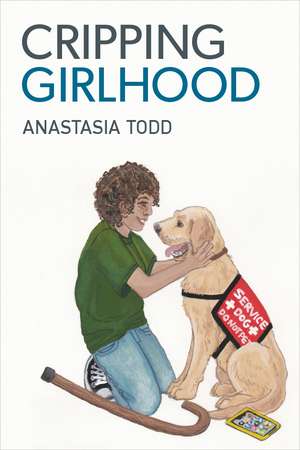Cripping Girlhood: Corporealities: Discourses Of Disability
Autor Anastasia Todden Limba Engleză Paperback – 28 mai 2024
By closely examining the ways that disabled girls represent themselves, Anastasia Todd goes beyond a critique of the figure of the privileged, disabled girl subject in the national imagination to explore how disabled girls circulate their own capacious re-envisioning of what it means to be a disabled girl. In analyzing a range of cultural sites, including YouTube, TikTok, documentaries, and GoFundMe campaigns, Todd shows how disabled girls actively upend what we think we know about them and their experience, recasting the meanings ascribed to their bodyminds in their own terms. By analyzing disabled girls’ self-representational practices and cultural productions, Todd shows how disabled girls deftly theorize their experiences of ableism, sexism, racism, and ageism, and cultivate communities online, creating archives of disability knowledge and politicizing other disabled people in the process.
| Toate formatele și edițiile | Preț | Express |
|---|---|---|
| Paperback (1) | 198.89 lei 3-5 săpt. | +12.02 lei 6-12 zile |
| UNIVERSITY OF MICHIGAN PRESS – 28 mai 2024 | 198.89 lei 3-5 săpt. | +12.02 lei 6-12 zile |
| Hardback (1) | 473.41 lei 3-5 săpt. | |
| UNIVERSITY OF MICHIGAN PRESS – 28 mai 2024 | 473.41 lei 3-5 săpt. |
Din seria Corporealities: Discourses Of Disability
-
 Preț: 214.26 lei
Preț: 214.26 lei -
 Preț: 246.08 lei
Preț: 246.08 lei - 8%
 Preț: 466.57 lei
Preț: 466.57 lei -
 Preț: 236.41 lei
Preț: 236.41 lei -
 Preț: 170.78 lei
Preț: 170.78 lei -
 Preț: 195.99 lei
Preț: 195.99 lei -
 Preț: 233.13 lei
Preț: 233.13 lei -
 Preț: 251.95 lei
Preț: 251.95 lei -
 Preț: 203.66 lei
Preț: 203.66 lei -
 Preț: 189.14 lei
Preț: 189.14 lei -
 Preț: 274.83 lei
Preț: 274.83 lei -
 Preț: 275.22 lei
Preț: 275.22 lei -
 Preț: 272.17 lei
Preț: 272.17 lei - 19%
 Preț: 476.36 lei
Preț: 476.36 lei - 5%
 Preț: 192.95 lei
Preț: 192.95 lei -
 Preț: 236.90 lei
Preț: 236.90 lei -
 Preț: 212.88 lei
Preț: 212.88 lei -
 Preț: 191.45 lei
Preț: 191.45 lei -
 Preț: 203.99 lei
Preț: 203.99 lei -
 Preț: 170.64 lei
Preț: 170.64 lei -
 Preț: 201.27 lei
Preț: 201.27 lei -
 Preț: 260.05 lei
Preț: 260.05 lei -
 Preț: 201.36 lei
Preț: 201.36 lei -
 Preț: 238.43 lei
Preț: 238.43 lei - 19%
 Preț: 479.70 lei
Preț: 479.70 lei -
 Preț: 234.84 lei
Preț: 234.84 lei -
 Preț: 297.31 lei
Preț: 297.31 lei - 19%
 Preț: 420.98 lei
Preț: 420.98 lei - 19%
 Preț: 448.99 lei
Preț: 448.99 lei -
 Preț: 171.84 lei
Preț: 171.84 lei -
 Preț: 204.58 lei
Preț: 204.58 lei -
 Preț: 236.63 lei
Preț: 236.63 lei -

Preț: 198.89 lei
Nou
Puncte Express: 298
Preț estimativ în valută:
38.06€ • 40.02$ • 31.45£
38.06€ • 40.02$ • 31.45£
Carte disponibilă
Livrare economică 27 martie-10 aprilie
Livrare express 12-18 martie pentru 22.01 lei
Preluare comenzi: 021 569.72.76
Specificații
ISBN-13: 9780472056743
ISBN-10: 0472056743
Pagini: 230
Ilustrații: 17
Dimensiuni: 152 x 229 x 18 mm
Greutate: 0.31 kg
Editura: UNIVERSITY OF MICHIGAN PRESS
Colecția University of Michigan Press
Seria Corporealities: Discourses Of Disability
ISBN-10: 0472056743
Pagini: 230
Ilustrații: 17
Dimensiuni: 152 x 229 x 18 mm
Greutate: 0.31 kg
Editura: UNIVERSITY OF MICHIGAN PRESS
Colecția University of Michigan Press
Seria Corporealities: Discourses Of Disability
Notă biografică
Anastasia Todd is Assistant Professor of Gender and Women’s Studies at the University of Kentucky.
Recenzii
Winner: 2022 Tobin Siebers Prize
“In Cripping Girlhood, Anastasia Todd delicately handles discourses surrounding living breathing disabled girls (and women) without ever passing judgment on any particular girl or the ways she might be implicated in the reproduction of harmful narratives about disability. It’s a love letter to crip girls, flawlessly and accessibly written. For feminist disability studies scholars, this book will read like having a conversation with a group of colleague-friends.”
“Cripping Girlhood advances the field of feminist disability studies and brings digital media studies more fully into dialogue with critical disability studies. This monograph offers disability studies new tools for exploring contemporary digital subjectivity, as well as sharing insights into the normative construction of the girl in contemporary U.S. culture. Anastasia Todd’s conceptualization of the disabled girl is nuanced and intersectional, and the book is a pleasure to read.”
"Cripping Girlhood does not shy away from the discomforting questions about who society deems profitable or expendable...This book invites readers to ask an important questions: in a culture that primarily values production, where do those of us who cannot produce fit? Rated: Highly recommended."
Descriere
Disabled girls’ complex roles in contemporary media culture
Cuprins
Table of Contents
List of Illustrations
Acknowledgements
Introduction: Cripping Post-ADA Disabled Girlhood
1. The Futurity of Disabled Girlhood
2. From Disabled Girlhood 2.0 to the “Crip-fluencer”
3. Domesticating Disability: Crip Girls and Their Dogs
4. The Crip Afterlife of Jerika Bolen
5. Coda: Cripping Disability Visibility in Fascist Times
6. Notes
7. Bibliography
8. Index
List of Illustrations
Acknowledgements
Introduction: Cripping Post-ADA Disabled Girlhood
1. The Futurity of Disabled Girlhood
2. From Disabled Girlhood 2.0 to the “Crip-fluencer”
3. Domesticating Disability: Crip Girls and Their Dogs
4. The Crip Afterlife of Jerika Bolen
5. Coda: Cripping Disability Visibility in Fascist Times
6. Notes
7. Bibliography
8. Index
